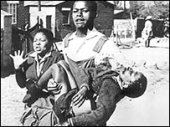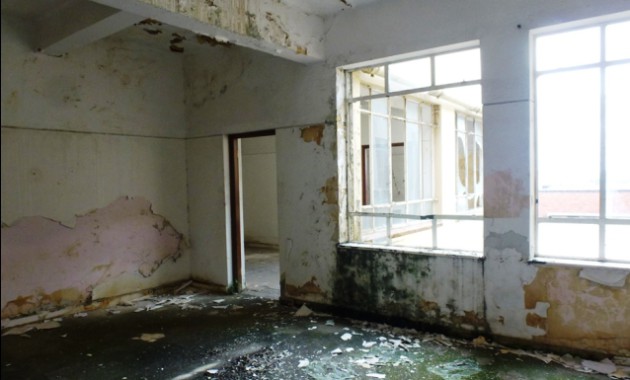Some men take the hard line and some take none at all
And some just want their freedom and they wind up behind a prison wall
There are cops on every corner and they know what they don't like
And if you're it then you know that the street's no place for you at night
Lungile Tabalaza he was a young man only twenty
Lived in New Brighton township just outside of Port Elizabeth
In a small house with his family, he lived through violations
Went to school in Kwazakhele with the Bantu Education (and they call it education, oh yeah)
Well, the cops came Monday morning and they took him on suspicion
Of robbery and arson, the law makes no provision
So they handed him to Plain Clothes, the Special Branch elite
And it doesn't really matter how strong you are
They've got ways to make you speak
They gonna make you speak if they wanna hear you speaking
They gonna get it out of you, they gonna hear your voice
Well, whatever happened in that office
God and the cops will only know
'Course the law has ways of keeping quiet
So that nothing at all would show
But about three o'clock that same afternoon
Lungile fell five floors
Lay dead below on the street outside
They quickly rushed his body behind closed doors
They rushed the body behind — behind the doors
Well, some say it was murder and some say suicide
But this is not the first time that men have gone in there and died
From New York and from London came angry cries and protests
And at his home the mourners come to ask for his eternal rest
And they sing and they cry and they ask and they ask and they ask
And they ask for his rest
Now some men take the hard line and for that they get the rope
And some men fall from windows and others slip on bars of soap
Whether the innocent are guilty, Lungile died just the same
And in the halls of justice the overseers just carry on with the game
They carry on with the game.
And some just want their freedom and they wind up behind a prison wall
There are cops on every corner and they know what they don't like
And if you're it then you know that the street's no place for you at night
Lungile Tabalaza he was a young man only twenty
Lived in New Brighton township just outside of Port Elizabeth
In a small house with his family, he lived through violations
Went to school in Kwazakhele with the Bantu Education (and they call it education, oh yeah)
Well, the cops came Monday morning and they took him on suspicion
Of robbery and arson, the law makes no provision
So they handed him to Plain Clothes, the Special Branch elite
And it doesn't really matter how strong you are
They've got ways to make you speak
They gonna make you speak if they wanna hear you speaking
They gonna get it out of you, they gonna hear your voice
Well, whatever happened in that office
God and the cops will only know
'Course the law has ways of keeping quiet
So that nothing at all would show
But about three o'clock that same afternoon
Lungile fell five floors
Lay dead below on the street outside
They quickly rushed his body behind closed doors
They rushed the body behind — behind the doors
Well, some say it was murder and some say suicide
But this is not the first time that men have gone in there and died
From New York and from London came angry cries and protests
And at his home the mourners come to ask for his eternal rest
And they sing and they cry and they ask and they ask and they ask
And they ask for his rest
Now some men take the hard line and for that they get the rope
And some men fall from windows and others slip on bars of soap
Whether the innocent are guilty, Lungile died just the same
And in the halls of justice the overseers just carry on with the game
They carry on with the game.
inviata da Bernart Bartleby - 18/11/2015 - 11:52
Bernart Bartleby - 18/11/2015 - 11:59
It is also a very South African story, telling of the darkness and brutality of apartheid, which Lucey covered as a television journalist and also sang about as a protest singer.
Although his overtly left-wing songs drew the attention of the state and the security police in the late 1970s, it took years before he found out why his promising musical career came to an inexplicable end in the early 1980s. In 1995 a security branch policeman, Paul Erasmus, revealed in the Mail & Guardian how his covert operation destroyed Lucey’s career.
So Erasmus fucked up your life?
“Ja, ja, ja, but, once again, put it in the perspective of what was happening in South Africa and what was happening to other people … I was relatively lucky, I was relatively easily let off the hook — I wasn’t murdered.”
Are you and Erasmus friends now?
“Yes, I would say so. And I know it is very painful to some of my old friends. It is painful for people who I am very friendly with who were also Paul Erasmus’s victims. But I do believe and I do see Paul Erasmus from time to time and we spent some time together.” Lucey’s words trail off and he looks into the distance for new ones to express himself.
“And there is nothing to suggest that he is not deeply sorry for what he did and if he could turn that around he would. He can’t and the best that he could hope for is forgiveness from people.”
Mail&Guardian
Although his overtly left-wing songs drew the attention of the state and the security police in the late 1970s, it took years before he found out why his promising musical career came to an inexplicable end in the early 1980s. In 1995 a security branch policeman, Paul Erasmus, revealed in the Mail & Guardian how his covert operation destroyed Lucey’s career.
So Erasmus fucked up your life?
“Ja, ja, ja, but, once again, put it in the perspective of what was happening in South Africa and what was happening to other people … I was relatively lucky, I was relatively easily let off the hook — I wasn’t murdered.”
Are you and Erasmus friends now?
“Yes, I would say so. And I know it is very painful to some of my old friends. It is painful for people who I am very friendly with who were also Paul Erasmus’s victims. But I do believe and I do see Paul Erasmus from time to time and we spent some time together.” Lucey’s words trail off and he looks into the distance for new ones to express himself.
“And there is nothing to suggest that he is not deeply sorry for what he did and if he could turn that around he would. He can’t and the best that he could hope for is forgiveness from people.”
Mail&Guardian
×
![]()











Parole di Roger Lucey, cantautore sudafricano, bianco.
Musica di Roger Lucey e della sua band, gli Zub Zub Marauders
Nell’album intitolato “The Road is Much Longer”, pubblicato nel 1979
Nel 2000 Roger Lucey ha pubblicato una raccolta dal titolo "21 Years Down The Road", con la stessa copertina di “The Road is Much Longer”
Was detained on 10 July 1978 in connection with arson attacks and the robbery and burning of a delivery van. He died the same day in custody at the Sanlam Building, Strand Street, Port Elizabeth. Police claimed he had committed suicide by jumping from the fifth floor of the Sanlam Building. At the inquest in October 1978, the government pathologist acknowledged that several bruises and lacerations could have been sustained before he fell. The inquest held found no one responsible for his death. (dal sito della Truth Commission sudafricana)
Non ho purtroppo trovato in Rete fotografie del giovane nero sudafricano Lungile Tabalaza di Port Elizabeth, che il 10 luglio 1978 fu arrestato e ucciso dalla polizia speciale del regime razzista. Torturato per ore, fu poi gettato in strada dal quinto piano. Dissero che si fosse suicidato… Nessuno fu mai indagato per la sua morte…
Ho trovato invece molte foto dell’autore di questa canzone in memoria di una vittima invece dimenticata… Si tratta del cantautore bianco Roger Lucey, che all’epoca era un militante anti-apartheid e che per canzoni come questa fu perseguitato dalla polizia segreta (la speciale unità “politica” denominata STRATCOM) ed ebbe la carriera musicale stroncata dalla censura. In seguito, Roger Lucey ha proseguito con successo il suo mestiere di musicista ed è diventato anche un apprezzato giornalista, scrittore e film-maker. Alcune sue foto lo ritraggono sorridente in compagnia di un suo amico, tal Paul Erasmus, che negli anni del regime era un dirigente delle unità speciali di polizia, un torturatore feroce, e che fu anche il suo diretto persecutore… Dalla fine degli anni 90, Erasmus e molti altri figli di puttana del regime hanno reso testimonianza di fronte alla Truth Commission, la commissione per la verità e la riconciliazione, e hanno patteggiato pene molto lievi per tutti gli omicidi, le violenze, le torture e i crimini commessi a danno della popolazione nera negli anni dell’Apartheid…
Sono contento che Lucey ed Erasmus si siano riconciliati a tal punto di diventare grandi amici…
Chissà come saranno contenti Lungile Tabalaza, Steven Biko e tutti gli altri “kaffir” (“nigger”, sporco negro, in afrikaans) morti ammazzati…
Per finire, una curiosità: sia Lungile Tabalaza che Steven Biko furono torturati e uccisi nelle stanze del Sanlam Building a Port Elizabeth, sede del Security Branch… “September 77, Port Elizabeth, weather fine. It was business as usual in police room 619.” (Peter Gabriel)